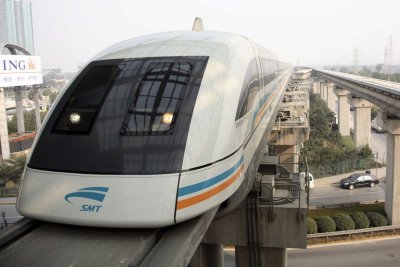
A maglev (magnetically levitating) train approaches its terminus in Shanghai, China, in 2008. U.S. Transportation Secretary Sean Duffy announced Friday he will revoke a $26 million grant to Maryland for a maglev train from D.C. to Baltimore. File Photo by Qilai Shen/EPA
Aug. 1 (UPI) — U.S. Department of Transportation Secretary Sean Duffy announced Friday that the Federal Railroad Administration will cancel two grants totaling more than $26 million for the Baltimore-Washington maglev project.
The department’s press release about the Superconducting Magnetic Levitation Project said it has seen “nearly a decade of poor planning, significant community opposition, tremendous cost overruns, and nothing to show for it.”
The release called the project a “boondoggle.”
As part of its analysis, the FRA also determined the project would result in “significant, unresolvable impacts to federal agencies and federal property, including national security agencies,” the release said.
“We want big, beautiful projects worthy of taxpayer dollars — including high-speed rail. This project lacked everything needed to be a success from planning to execution. This project did not have the means to go the distance, and I can’t in good conscience keep taxpayers on the hook for it,” Duffy said in a statement. “We’ll continue to look for exciting opportunities to fund the future of transportation and encourage innovation.”
The Northeast Maglev would eventually connect Washington, D.C., and New York City. The train would be able travel at speeds of more than 300 mph to make the trip one hour long.
Maglev is a system of rail transport whose rolling stock is levitated by electromagnets rather than rolled on wheels, eliminating rolling resistance.
Compared with conventional railways, maglev trains have higher top speeds, superior acceleration and deceleration, lower maintenance costs, improved gradient handling, and lower noise. But they are more expensive to build, cannot use existing infrastructure, and use more energy at high speeds.
Indirect effects of this project also would impair critical infrastructure and ongoing agency missions, the release said. Government agencies harmed by this project would have included: the National Security Agency, U.S. Department of Defense and Fort George G. Meade, National Aeronautics and Space Administration, U.S Department of Agriculture, U.S. Secret Service, U.S. Department of Interior — Fish and Wildlife Service and National Park Service, and the U.S. Department of Labor.
In 2015, the federal government gave Maryland a grant of $27.8 million to study a high-speed maglev train line that could connect Baltimore and Washington, D.C., in 15 minutes. Duffy is now canceling that grant. The funding for such a grant was authorized in 2005, when Congress set aside $90 million for maglev projects.
In 2021, China unveiled a maglev train that it said can travel 373 mph. In July 2020, the government said it planned to build a network with as many as nine maglev lines that include 620 miles of track.